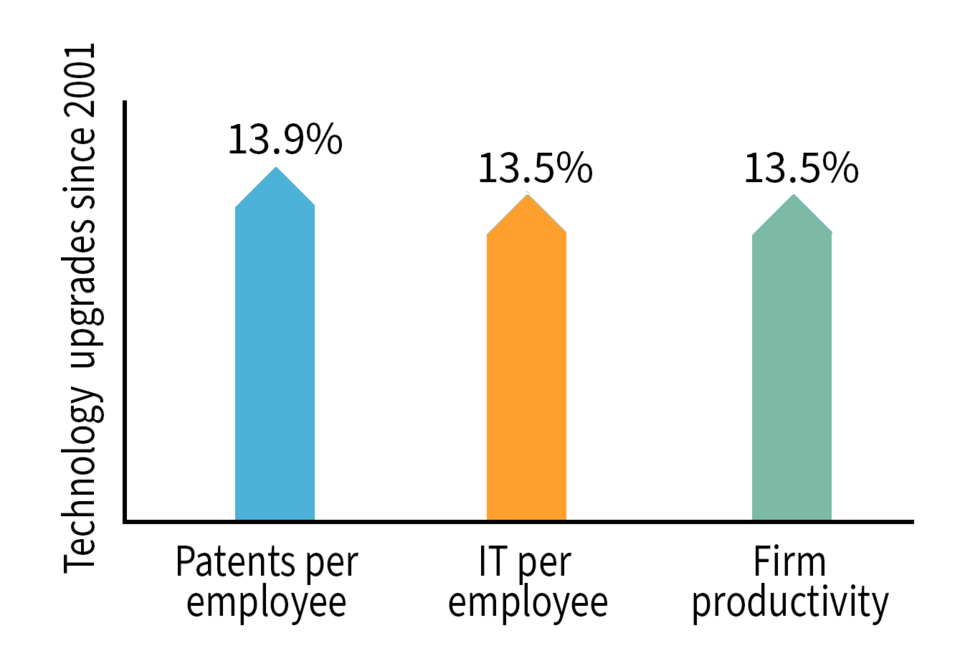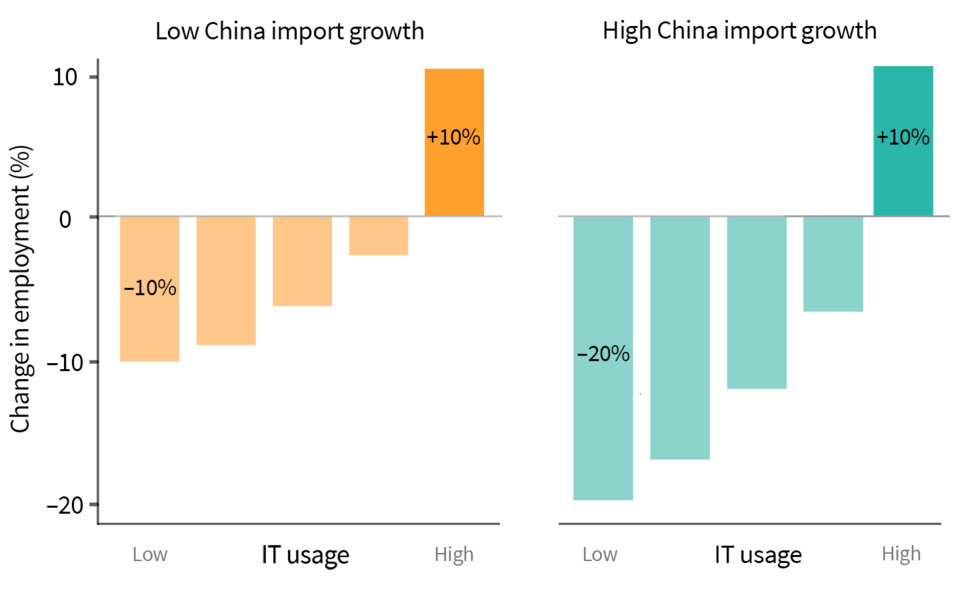How Did Open Trade with China Impact European Firms?
How Did Open Trade with China Impact European Firms? [ 5 min read ]
Insights
- Import competition from China accounted for 14% of European technological upgrading (2000–2007) following China’s entry into the WTO in 2001.
- Such gains to innovation and productivity are underappreciated in the current debate, but may ultimately outweigh the costs of trade competition with China.
China’s global exports skyrocketed in the wake of its 2001 accession to the World Trade Organization (WTO). China’s growing role in global trade, a phenomenon dubbed the “China shock,” has led to trade wars and continuing controversy over how exports from China, the “factory of the world,” have hurt Western manufacturing. Yet, the diverse impact of China’s WTO accession upon different types of firms remains less clear, in particular on technology, innovation, and firm productivity.
The data. Researchers examined the performance and total firm productivity of more than half a million firms in 12 European countries from 1996 to 2007, the period immediately before and after China joined the WTO. The primary dataset used in the study involves Bureau Van Dijk’s Amadeus, which contains firm-level information on nearly all public and private businesses operating in Germany, France, the U.K., Austria, Denmark, Finland, Ireland, Italy, Norway, Spain, Sweden, and Switzerland.
In addition to Amadeus, researchers gathered data on the total number of patents granted, company investments in information technology (IT), expenditure on research and development (R&D), and the volume of imports originating from China. This study is one of the largest ever undertaken on the impact of trade with China on European technological change.
Researchers measured the impact of the China shock on technological change among European firms by comparing their patent production, IT usage, and total firm productivity before and after China's accession to the WTO in 2001.
Impact of China import competition on patents, IT, and productivity

Increased import competition with China induced technological innovation. Researchers estimate that the China shock accounted for 14% of European technological upgrading from 2000 to 2007. More specifically, imports from China accounted for about 13.9% of the increase in aggregate patents per worker and a 13.5% increase in both IT usage and firm productivity from 2000 to 2007. Among firms that were more exposed to imports from China, there was an absolute rise in firm productivity fueled by increases in patents, rising R&D expenditures, and the use of IT. Altogether, import competition with China had net positive effects on technological growth and innovation among European firms.
Researchers hypothesize that these findings are consistent with a “trapped factor” model, in which the opportunity cost of innovating decreases in the face of increased competition from a low-wage country like China. Trapped resources that the company had been using to produce low-tech goods prior to the China shock no longer generate as much profit. As such, firms are more willing to free up resources to experiment and innovate and, if successful, produce higher-end goods.
Employment and firm survival rates for European low-tech firms suffer in the wake of the China shock. Low-tech, inefficient firms — firms with few to no patents and low IT and firm productivity — suffered high exit rates and/or worker lay-offs when exposed to import competition from China. Specifically for these firms, every 10% increase in imports from China was associated with a 3.6% fall in employment and a decrease in survival probability of 0.57%, representing a roughly 25% increase in exit rates. Imports from China also significantly reduced the profitability of such firms and decreased the overall demand for unskilled workers in Europe. By contrast, high-tech firms enjoyed greater protection from China’s import shock: both their employment rates and their survival rates remained either relatively stable or even grew.
Job growth among low and high China import industries with low and high IT usage

Comprehending the full impact of the China shock is key to crafting policy. Trade competition with China has driven significant technological upgrading in European firms. The negative consequences for exposed firms — characterized by lower firm survival and employment rates, especially in low-tech firms — are often immediate and well documented. However, this research highlights an important upside to the China shock — technological upgrading and increased innovation — which is often less visible and slower to manifest. Understanding both the negative and the positive impacts of the China shock is critical to crafting optimal trade policy.
